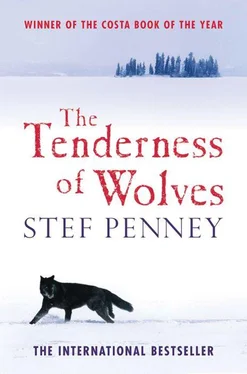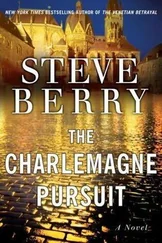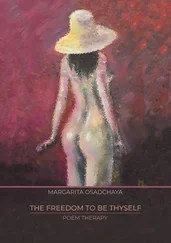‘Stewart!’ he shouts as he runs. ‘Stewart! Wait!’
He doesn’t know what else he is going to say. He thinks of Mrs Ross–bleeding to death, perhaps. And how he did not save her.
He has almost reached the trees at the foot of a large hillock when there is a movement up ahead. The first sign of life he has seen.
‘Don’t shoot, please. It is I, Moody … Don’t shoot …’ He is holding his rifle by the barrel, waving it to show his peaceful intentions.
There is a flash of light from under the trees, and something strikes him with tremendous force in the midriff, knocking him over backwards. The branch, or whatever it was he ran into, seemed to hit him just over his scar, not helping matters.
Winded, he tries to get up, but can’t, so he lies for a few moments, trying to get his breath. His spectacles have fallen off; really they are not the thing for Canada, always frosting or steaming up at the wrong moments, and now … he gropes around him in the snow for them, encounters nothing but coldness everywhere. Surely someone could think of something more convenient.
Eventually he finds the rifle, and picks it up. At this point, because the stock is slippery and warm, he becomes aware of the blood. Raising his head with a great effort, he sees blood on his coat. He is annoyed; in fact, he is furious. What a bloody fool he is, charging into trouble like that. Now Alec will be in danger too, and it is all his fault. He thinks of calling out to the boy, but something, some greater sense from somewhere, stops him. He concentrates on getting the rifle into position; at least he can fire a shot, not roll over and die without a murmur. He will not be entirely useless; what would his father say?
But there is silence, as though he is, once again, the only person for miles around. He will have to wait until he can see something. Well, the person who fired, whoever it was, obviously doesn’t think he needs to come and finish off the job. Fool.
Then, at some later point, he looks up and sees a face above him. It is a face he distantly remembers from Hanover House; the face of a drunk, impassive and empty, closed somehow, like the stone that blocks a burrow. It is not drunken now, but there is no curiosity or fear, nor even triumph, there. It is the face, he realises, of Laurent Jammet’s killer. The man whose footprints in the snow have drawn them all here. It is what he came for–to know him, and to find him. And now he has. And it is too late. Typical, thinks Donald, for him to be so slow on the uptake, just like his father always said. And with a rush of heat to his eyes he thinks, Oh, to hear my father’s voice chastising me now.
Donald starts to think it would be a good idea to aim the rifle at the face, but by the time he’s thought it, the face has gone again, and his rifle has gone too. He is so tired. Tired and cold. Perhaps he will just lay his head back on the soft snow; rest a while.
Outside the cabin, I can see no one, not even Stewart, who holds my left arm twisted so tight behind my back I can only take shallow breaths for fear my shoulder will come out of its socket. No sign, at least, of Parker lying wounded, or worse, in the snow. No sign of Half Man, if that is who it is. Stewart brandishes his rifle in front of me. I am his shield. There is some movement, but all behind the cabin; a sound–inconclusive. He inches me towards the end wall, to where the sun is starting to burn the horizon. Of course, I have no scarf to protect my eyes. And my hands are bare.
‘Careless,’ he says, as though reading my mind. ‘And your eyes too. He shouldn’t have brought you here.’ He sounds mildly disappointed.
‘He didn’t bring me,’ I say through gritted teeth. ‘When you had Jammet killed, you brought me.’
‘Really? Well, well, I had no idea. I thought you and Parker …’
It hurts to talk, but it pours out of me; I am molten with anger. ‘You have no idea how many people you have hurt. Not just the ones you killed, but …’
‘Shut up,’ he says calmly. He is listening. A crackle in the trees. From far to our left, there is a deafening crack–a rifle. It sounds different from before.
‘Parker!’
I can’t help it. A split second later I could bite my tongue off; I don’t want him to think it is a cry for help and come running.
‘I’m all right!’ I shout with my next breath. ‘Please don’t shoot. He’ll do a deal. We’ll go away. Just let us go, please …’
‘Shut up!’
Stewart puts a hand over my mouth, squeezing it so tight it feels as though his fingers will break my jaw. We move like some ungainly four-legged creature to the end of the cabin, but again there is no one in sight.
Another shot splits the silence in two–to our left, beyond the cabin now. And after it, this time, a noise. A human moan.
I gasp, the breath catching in my throat like tar.
Stewart shouts in a strange language. A command? A question? If Half Man is listening he does not answer. Stewart shouts again, the pitch of his voice taut, his head whipping back and forth, unsure of himself. Now I have to act, I tell myself; now while he is uncertain. He lets go his grip on my mouth so that he can point the rifle one-handed. I grasp the knife in my pocket, working it round until the handle is snug in my palm. I start to pull it out, inch by inch.
And then a voice comes from somewhere in the trees, but surely not the voice of Half Man. A young voice answers, in the same language. Stewart is disconcerted; he doesn’t know the voice. This is not part of his plan. I swing the knife across my body and into his side, as hard as I can. Although at the last moment he seems to realise what is happening and flinches away, the blade meets yielding resistance, and he howls with pain. I have a glimpse of his face, and his eyes catch mine–they are reproachful, bluer than sky; but he seems to have a half-smile on his face, even as he swings the rifle towards me.
I run. Another rifle crack, deafening me, somewhere very close, but I feel nothing.
Alec watches Donald run across the frozen lake, despite his shouts, and then his curses. He shouts to him to stop, but he does not stop. Alec feels an ugly fear clutch at his insides, is afraid he might vomit, and so turns away. Then he tells himself not to be a baby; he must do as his father would have done, and sets off after him.
Alec is a hundred yards behind when the flash comes–he would later swear he heard nothing–and Donald falls. Alec throws himself down behind some reeds that poke through the ice. He holds George’s rifle cocked in front of him, grinding his teeth in his anger and his fear. They shouldn’t have shot Donald. Donald was kind to his mother. Donald told him about his beautiful, clever aunts who live on a huge lake like the sea. Donald hurt no one.
His breath hisses through his teeth, too loud. He scans the trees–they have the advantage of cover–then gets up and runs, half crying, bent double; throws himself flat in the snow and crawls to the top of a hummock to look. He has reached the first of the trees, and it is possible they haven’t seen him. Up ahead, there is another rifle shot, and then silence. He couldn’t see the flash. It was not aimed at him. He darts from one tree trunk to the next, pausing, looking right and left, everywhere. His breathing sounds like sobbing; is so loud it must give him away. He thinks of the others–the white lady and the tall man–to give himself courage.
This rifle is heavier than the one he is used to, the barrel longer. It is a good rifle, but he has had little practice. He knows he will have to get close to have a chance. He works his way closer to the source of the shot. To his right there is the hump of rock that interrupts the smooth flow of the lake, and ahead, among the trees, he glimpses a building of some sort. A little closer, and he sees two figures outside it–the man who killed his father hiding behind the white lady.
Читать дальше












